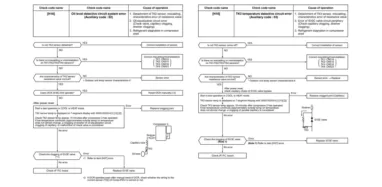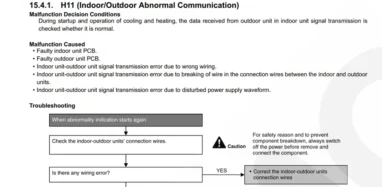Air conditioners are one of the most used electrical appliances in our homes during summer. Perhaps, it is one of the crucial things you need to fight the blazing heatwave. When you purchase an air conditioner with your precious money, you want to use it safely and avoid causing any damage to it. Therefore, you must follow the right guidelines to ensure the safety of your air conditioner and yourself.
We have been frequently asked by many people that whether if it is safe to plug an air conditioner into a non-grounded outlet using an adapter or not. Now, this is a very important and serious question that needs to be addressed because it is concerned about the safety of you & your air conditioner. So let’s move into the article and explore everything.
Difference between grounded & non-grounded outlets
First of all, you need to have a quick understanding of what a grounded and non-grounded outlet is. After that, you will be easily able to understand how they work and which one is better for your air conditioner and which one is not.
Perhaps, you have been plugging various electrical appliances in & out every day. Have you ever noticed that some of the plug outlets have just two holes while some have three holes? Why is that so? What’s the difference between both and which one is better for your AC? Here’s the thing:
What is a Non-Grounded Outlet?
All the electrical outlets have a live wire that brings the electricity from the power source to your appliance and a neutral wire that takes the electricity back from the appliance to the power source.
If an outlet has only these two wires (the live wire & the neutral wire) then it is called a non-grounded outlet. A non-grounded outlet is also called a two-prong outlet.
How to Identify Non-grounded Outlet?
If you are wondering how you can identify whether if your outlet is ungrounded then it is very easy. Just look at the number of holes. If there are just 2 holes then it means that it has only two wires (live & neutral) and does not have any ground wire. Thus it is an ungrounded outlet.
Uses of Non-grounded Outlet
An ungrounded outlet is most commonly used for small electrical appliances at your homes such as radios, lamps, and other appliances in your kitchen.
What is a Grounded Outlet?
A grounded outlet has three wires in total. The first one is the live wire that brings in the electricity and the second is the neutral wire that takes the electricity bag whereas the third additional wire is a ground wire that goes to the earth. It is also called a three-prong outlet.
Importance of Ground Wire
The ground wire is for safety purposes. Whenever a power surge occurs and there’s a fluctuation in voltage, the ground wire will save your appliance from any kind of damage. It will block the excessive incoming voltage and send it down to the ground ensuring minimum or no damage to your appliance.
Identifying Grounded Outlet & Its Uses
A ground outlet is also simple & easy to identify. If your outlet has three holes in it then it means that it is a grounded outlet.
Grounded outlets are usually used for big electrical appliances such as air conditioners, TV, and gaming consoles, etc due to the excellent safety it provides.
Non-grounded vs grounded outlet – Which one is safe?
A grounded outlet is safer to use than a non-grounded outlet in all sense.
This is how things work:
Whenever a power surge occurs, the excessive voltage will travel through the live wire to the appliance connected to the outlet. If there is no ground wire in the outlet, the excessive voltage will enter the appliance and fry all of its internal parts. This way the appliance will get burnt. Since there is no ground wire, there is also a huge risk that the appliance may catch fire or the appliance become a live source of current and you get electrocuted.
On the other hand, if there is a ground wire in the outlet and a power surge occurs, the ground wire will block the incoming excessive voltage from entering the appliance. Instead, it will transfer the excessive voltage to the ground where the earth will absorb it. Consequently, your appliance will be saved from any significant damage, and also it will prevent any unfortunate accident like a fire or electrocution.
Therefore, a grounded outlet is much safe than a non-grounded outlet because it not only protects your appliances from any kind of damage but also helps to save your life & loss of property.
Should i plug an AC into a non-grounded outlet with an adapter?
No, we do not recommend plugging an air conditioner into a non-grounded outlet with an adapter.
Your air conditioner counts as a heavy electrical appliance that is more vulnerable to power surges. Therefore, it needs more safety to work perfectly for a long time.
If you will plug your AC into a non-grounded outlet with an adapter, then it will be a great risk. Whenever there will be a power surge, your AC will have no protection. The excessive current can not only burn the AC unit and cause a fire but also make the air conditioner a live source of current and get you electrocuted. Therefore, it can be a huge disaster, both economical & safety-wise.
When your AC will be plugged into a grounded outlet, it will have much better protection in case of any power surge. Whenever the excessive voltage will come at your AC, the ground wire will prevent it from entering the unit & damaging it. Instead, it will safely transfer the excessive current down to the ground. Thus, your AC will be saved from potential damage and also you will be saved from a huge danger of electrocution and fire.
Conclusion
We just saw in detail that how a grounded outlet is safe than a non-grounded outlet in every sense.
We never recommend and neither should you plug your AC into a non-grounded outlet using an adapter because it is just not only unsafe for your AC but also your safety. Plugging the AC into a non-grounded outlet can cause serious damage to the AC, fire, short circuit, electrocution, and loss of money and property. Instead, we recommend you avoid taking any risk and only plug your AC into a grounded outlet (the one which has three holes and a ground wire). It’s because that’s what is better for your safety & the safety of your air conditioner.


